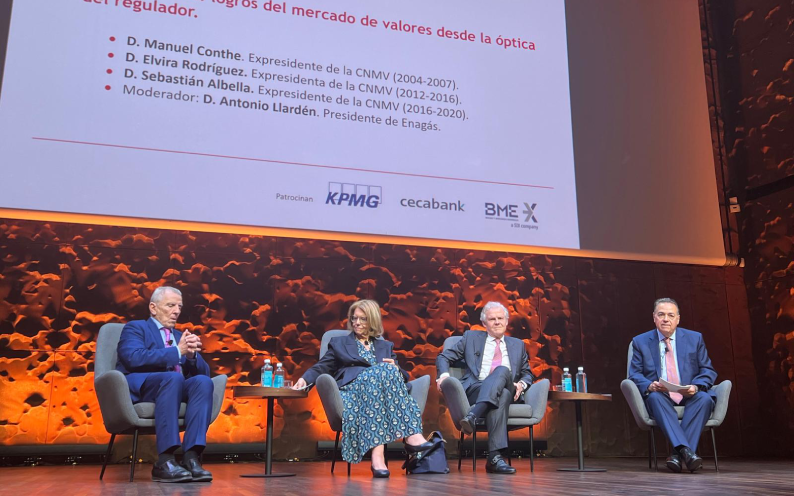Emisores Españoles, on the occasion of its fifteenth anniversary, gave me the opportunity to moderate the round table Achievements of the securities market from the regulator’s perspective with three former chairs of the National Securities Market Commission (CNMV) over the last twenty years. Thus, I had the privilege of leading the conversation between Manuel Conthe (who led the body between 2004 and 2007), Elvira Rodríguez (2011-2017) and Sebastián Albella (2017-2020).
It was a very interesting time to share with them and it was a pleasure to hear how they see listed companies from the experience and perspective of their mandates, which coincided with different stages of my chairmanship of Enagás.
The current Chairman of the CNMV, Rodrigo Buenaventura, had already given a first reflection of interest at the inauguration, pointing out that we have increasingly stronger, more professional listed companies, focused on the interests of shareholders and other stakeholders, but that at the same time there are dwindling numbers of listed companies: 35% fewer in Europe than in 2001. And he argued that in order to finance the huge investments that need to be made – and he mentioned the recent Letta report, which points to energy infrastructure, among other things – the European economy needs stock markets, public markets, more than ever.
A listing on the stock exchange, or ‘going public’ as it is called in the English-speaking world, is, in a sense, just that. When a company goes public, its public exposure increases dramatically and it becomes subject to greater scrutiny by investors, analysts, regulators, journalists, etc. In short, it goes above the radar. This is because listed companies are committed to transparency and truthfulness of information so that all market players can act accordingly.
Logically, going public also offers interesting incentives for a company, such as strengthening its capital structure and growth options, increasing its visibility, strengthening its reputation and brand, or being able to attract and retain the best talent thanks to the attractiveness of working for a listed company. And going public is also an opportunity, which we discussed at length in our panel, to strengthen an increasingly valuable asset for any organisation, corporate governance.
Good governance is evidence of a company’s institutional quality and facilitates the achievement of its objectives, helping to consolidate the trust of investors and society. This vital and delicate intangible – trust – has been the key to the stock markets since their inception, which in Spain can be traced back to the market exchanges (lonjas) such as the one in Barcelona.
As was recalled during the debate, in our country the starting signal for corporate governance was given in 1998 by the Olivencia Report, which laid the foundations for what was to be articulated years later, in 2006, in the Unified Code of Good Governance for listed companies. In this context, I would like to emphasise one fundamental idea: over the last two decades, corporate governance has evolved in a very remarkable way along with our society, successfully integrating environmental, social and diversity variables… although the key remains the same: rigour and transparency. And another one that I share: common sense, which needs to be one of the attributes that should permeate corporate governance.
Enagás has been at the forefront of this evolution of corporate governance since our IPO and listing on the Ibex 35 in 2002. Our commitment to best practices during these more than 20 years is endorsed today by recognitions such as that of AENOR, which has awarded us the highest rating, G++, in its Corporate Governance Index 2.0. Or, and this is a source of real pride, that more than half of Enagás’ professionals also trust the company as shareholders, after joining the flexible remuneration programme we launched in February.
Trust and dialogue between an organisation and its stakeholders, whether they are employees or supervisors, united by a common goal: to do well, because this will benefit everyone and society as a whole.
